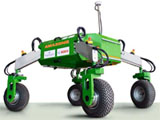Agricultural and Biological Systems Engineering, Department of

Department of Agricultural and Biological Systems Engineering: Faculty Publications
Kinetics-based inference of environment-dependent microbial interactions and their dynamic variation
Document Type
Article
Date of this Version
4-29-2024
Citation
Computational Biology | Research Article. May 2024 Volume 9 Issue 5. 10.1128/msystems.01305-23
Abstract
Microbial communities in nature are dynamically evolving as member species change their interactions subject to environmental variations. Accounting for such context-dependent dynamic variations in interspecies interactions is critical for predictive ecological modeling. In the absence of generalizable theoretical foundations, we lack a fundamental understanding of how microbial interactions are driven by environmental factors, significantly limiting our capability to predict and engineer community dynamics and function. To address this issue, we propose a novel theoretical framework that allows us to represent interspecies interactions as an explicit function of environmental variables (such as substrate concentrations) by combining growth kinetics and a generalized Lotka-Volterra model. A synergistic integration of these two complementary models leads to the prediction of alterations in interspecies interactions as the outcome of dynamic balances between positive and negative influences of microbial species in mixed relationships. The effectiveness of our method was experimentally demonstrated using a synthetic consortium of two Escherichia coli mutants that are metabolically dependent (due to an inability to synthesize essential amino acids) but competitively grow on a shared substrate. The analysis of the E. coli binary consortium using our model not only showed how interactions between the two amino acid auxotrophic mutants are controlled by the dynamic shifts in limiting substrates but also enabled quantifying previously uncharacterizable complex aspects of microbial interactions, such as asymmetry in interactions. Our approach can be extended to other ecological systems to model their environment-dependent interspecies interactions from growth kinetics.
Included in
Bioresource and Agricultural Engineering Commons, Environmental Engineering Commons, Other Civil and Environmental Engineering Commons


Comments
Open access.